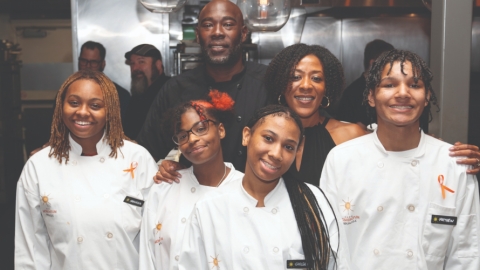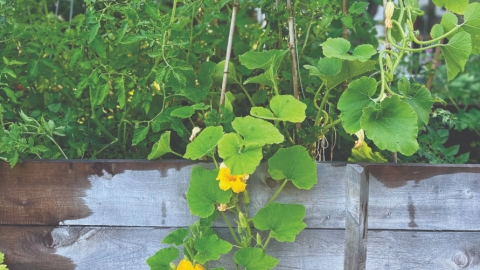Sustainability: From Composting to Carbon Offsets to Local Sourcing
Chefs and restaurateurs are creative by nature, and that creativity extends to finding innovative ways to reduce environmental impacts of preparing and selling food. But these efforts are not easy. In a busy restaurant kitchen, where time is of the essence, sorting plastic, glass and paper and composting take time, effort and other resources.
“It’s pretty difficult to do all the things,” says Henrietta Red chef-owner Julia Sullivan, “but I think if you’re doing some of the things you’re doing a pretty good job.”
Among the most visible tactics is composting, in which restaurants sort waste into recyclables, compostables and landfill trash. Early adaptors Crema, Margot Cafe and Bar and Adele’s, for example, partner with Compost Nashville, which transports organic kitchen waste to The Compost Company in Ashland City for upcycling into compost. (Edible Nashville calls on Compost Nashville after our Farm Dinners.)
Now in its 12th year of operation, The Compost Company diverts an estimated 20,000 tons of material from landfills annually, primarily from restaurants, hotels, grocery stores, food manufacturers and concessions at venues, including Geodis Park, Music City Center and the Country Music Hall of Fame. Compost Company works with restaurants, including Mitchell Delicatessen, Jeni’s Splendid Ice Creams and the Nashville Farmers Market, collecting serving materials and food waste and turning them into compost for gardening and landscaping uses.
“Composting is just one piece,” says Compost Company President Clay Ezell. At various points along the food chain, restaurateurs can reduce carbon footprints through choices related to ingredients, packaging and diversion of excess food to recipients who will use it rather than throw it away. (We love to hear about distillers and baristas giving their grain and grounds to farms and gardens.)
Here are a few forward-thinking Nashville enterprises investing in materials and practices to reduce their impact on the environment.
1 Kitchen
Possibly no one is leading the way to quite the extent as 1 Kitchen. Chef Chris Crary, culinary director, is supporting local farmers in a big way by sourcing sustainable local ingredients from Bloomsbury Farm, Bucksnort Trout Ranch, Greener Roots Farm and S.E. Daughtery & Sons Farm. 1 Kitchen follows the zero-waste playbook of parent organization 1 Hotel, which seeks to achieve a 90% reduction of waste directed to landfills. To that end, 1 Kitchen restaurant is swapping out single-use plastics for glass, providing compostable and recyclable carryout materials when possible, composting with The Compost Company and coordinating the removal, disposal and upcycling of glass with Justice Industries, a social enterprise that creates jobs and training opportunities for people with barriers to employment.
Working with Copia, a tech company that automates surplus donation and tracking, 1 Hotel’s food and beverage properties capture and deliver to the Nashville Rescue Mission and other nearby nonprofits an estimated 10,000 pounds of edible, uneaten food annually, eliminating water use and carbon emissions associated with food waste in a landfill. @1kitchennashville
Dozen Bakery
In spring 2024, Claire Meneely’s beloved Wedgewood-Houston bakery (relocating to Nolensville Road in 2025) became Climate Neutral Certified, decreasing emissions through practices recommended by the Change Climate Project. After calculating emissions the bakery cannot eliminate, Dozen purchases carbon offsets through Tradewater, monetarily supporting that organization’s program of disposing of used refrigerants to keep harmful emissions from entering the environment. @dozenbakerynashville
Henrietta Red
“We do as much as we can that’s not cost-prohibitive,” says Julia Sullivan, whose Germantown restaurant has received multiple nominations from the James Beard Foundation. The heaviest lift of that effort is the leftover shells from 2,500–3,000 oysters served weekly. The shells—along with discarded bones of fish butchered on site and eventually simmered into stock—get carried away by The Compost Company and ground into compost for gardening and landscaping. “A lot of people think the barrier to composting is logistics or space,” Sullivan says. “But it’s really very easy.” @henrietta_red
Bare Bones Butcher
Making use of a whole animal, including unglamorous proteins such as tendon, silver skin and cartilage, is what gives Bare Bones Butcher’s broth that velvety depth of flavor and texture, but resourcefulness of ingredients also makes good business sense. And if founders Wesley Adams and Patrick Davidson benefit economically, then so do the local farmers who supply their butcher shop in the Nations. “We now have reliability and quality control, developing animals to the best they can be,” Adams says of his long-standing relationships with humane suppliers such as Bear Creek and Palmer farms, which practice rotational grazing and other techniques to protect land and animals. “We are closing the loop from sustainable farming to a sustainable business model to sustainable provisions.” @barebonesbutcher









